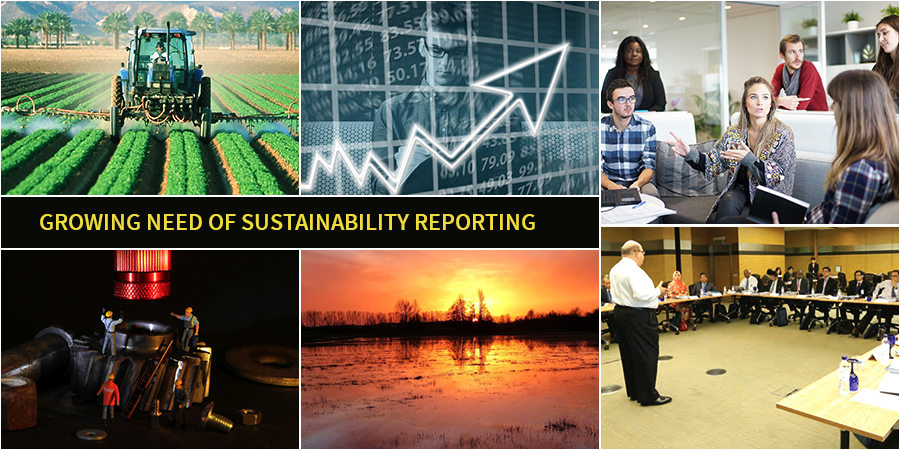Growing need of sustainability reporting

Sustainability has been constantly sought out in-line with our progress over the past few decades around the world. As the leading thinkers and economists from the seventies and later decades looked at the horizon, they proposed that based on our demands, the rate of production and consumption, simply wouldn’t sustain itself in the times to come. Renowned World Bank economist Herman Daly succinctly described this situation “The economy is the wholly owned subsidiary of the environment, not the reverse”.
Businesses started considering “sustainability” through its evident benefits in 4 key areas:
1) Environmental 3) Social
2) Economic 4) Governance
Sustainability in the business domain acquires both inward and outward roles which can be gathered from these key areas. Through the seventies, with the emergence of OECD guidelines for multinational corporations then introduction of Sullivan global principles of social responsibility to the decade of nineties which saw Valdez principles, up to now, in form of Global Reporting Initiatives (GRI), CDP and GRESB – sustainability reporting standards have gained formal recognition and endorsement from some of the most authoritative financial and nation states around the world.
Some of the organizational aspects that sustainability practices implementation, enhances are:
- Creating mobility, in terms of cross-border and cross-service line opportunities.
- It can enable creating the highest performing teams.
- Implementing stronger leadership programs.
- Building smarter and efficient workplaces.
- Implementing superior information management systems that seamlessly connects people.
- Developing communication strategies for sustainable business.
- Developing social responsibility initiatives.
- Managing the environmental footprint.
With measurable merits, sustainability reporting is required to be published in a specific format confirming to the standard(s) mentioned above depending on an organisation’s choice.
Developing the right environmental, social or economic matrices with information flow delivering the right numbers for the prescribed metrics within the key areas summarizes sustainability reporting, in short.
The 4 key stages of sustainability reporting are: Defining, reporting, monitoring and engaging.
In modern day organisations with extensive process complexity and cross-domain functions, opting for an automated solution which encompasses these stages and helps in generating compliant sustainability reports becomes an obvious choice.
Such software can base the reporting generated from the differing disciplines based on their function within the organisation through pre-defined parameters providing a glimpse of sustainability and CSR, environment, health and safety along with risk management.
However, organisations need to understand that the process of “defining” gestates and develops from the institutional habits, practices and knowledgebase. The transparency of such processes makes the task of monitoring and reporting for sustainability, easier.
The crucial aspect in this story is “engaging”; people within your organisation are the real agents of change and institutions live and breathe through their human resources. They can be at the social forefront through your CSR programs and the real value addition via feedback loop becomes their inclusiveness and initiative.
Sustainability reporting which satisfies regulatory criteria along with delivering compliant reports according to chosen sustainability reporting standard is the combination that software solutions can deliver with ease.



Useful Information, your blog is sharing unique information….
Thanks for sharing!!!